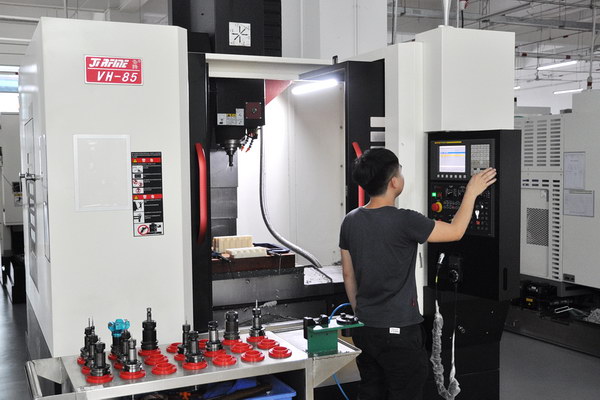Prototyping is an essential step in the product development process. Ideally, when you have a great idea for a product, you can go straight to manufacturing. However, in reality, it’s often best to find the right rapid prototyping companies to prototype your ideas before spending the money on mass production. Prototyping allows you to test Read more
Whats New

Prototyping is an essential step in the product development process. Ideally, when you have a great idea for a product, you can go straight to manufacturing. However, in reality, it’s often best to find the right rapid prototyping companies to prototype your ideas before spending the money on mass production.
Prototyping allows you to test your design and make sure that it is feasible and meets customer needs or are ready for manufacturing. It also helps to identify any potential problems with the design before too much money has been invested. By prototyping your product, you can ensure that it is ready for market and avoid costly mistakes.
Here’s a look at how to create prototypes and what to consider before moving to production.

How to create prototypes
A prototype is a three-dimensional representation of a design idea. It can be either a small-scale model or a larger one that is used for testing, depending on what you’re trying to test. For example, if you’re testing a new feature for a mobile app, you might create a basic prototype that includes the essential elements of the design. If you’re testing a new piece of hardware, you might need to create a more complex prototype that includes all the features and components. No matter what you’re testing, prototypes are an essential part of the development process.
When you’re starting a new project, it’s important to create prototypes to test your ideas, as it allows designers to test their ideas before investing in costly production processes. There are several methods for creating prototypes, including 3D printing, CNC machining, and injection molding. Each method has its own advantages and disadvantages, so it is important to choose the right one for the specific project.
1. 3D printing
Designers and engineers have long used prototypes to test the feasibility of new ideas. In the past, creating a prototype usually involved expensive and time-consuming machining operations. However, advances in 3D printing technology have made it possible to create prototypes quickly and inexpensively. The first step in using 3D printing for prototyping is to create a 3D model of the desired object. This can be done using specialized CAD software or by scanning an existing object. Once the model is complete, it can be exported to a file format that is compatible with 3D printers. The next step is to choose the appropriate printer and material. For complex prototypes, it may be necessary to use multiple print runs with different materials. Finally, the prototype can be post-processed as needed, such as by painting or sanding. With its ability to produce high-quality prototypes quickly and economically, 3D printing has become an essential tool for product development.

2. CNC machining
CNC machining is a great way to create prototypes quickly and easily. By using computer-controlled machinery, CNC machining can create complex shapes and patterns with a high degree of accuracy. This makes it ideal for creating prototypes, as well as for mass production. CNC machining is more expensive but can be used to create prototypes from a variety of materials, including metals, plastics, and composites. As a result, CNC machining is a versatile manufacturing technology that can be used to create high-quality prototypes quickly and easily.
3. Injection molding
Injection molding is one of the most popular methods for creating prototypes. It works by injecting molten plastic into a mold, where it cools and hardens to take on the shape of the mold. Injection molding is fast and efficient, and it produces prototypes that are extremely accurate and have a high level of detail. The biggest downside of injection molding is that it is relatively expensive, so it is best suited for projects that require a large number of prototypes.
If you are considering using injection molding to create prototypes, there are a few things you will need to keep in mind. First, you will need to choose the right type of plastic for your project. There are many different types of plastic, and each has its own set of properties that can impact the final result. Second, you will need to create a detailed design for your prototype. The more complex the design, the more difficult it will be to inject the plastic into the mold. Finally, you will need to find a reputable injection molding company that can produce high-quality prototypes at a reasonable price. With careful planning and execution, injection molding can be an excellent way to create prototypes for your next project.

Conclusion
When it comes to manufacturing your product, you will want to take the time to prototype your ideas first. This way, you can perfect the design and function of your product before mass-producing it. Prototyping also allows you to test out different materials and methods to find the most efficient and cost-effective way to manufacture your product.

If you’re in the construction industry, then you know that it can be tough to succeed. There are a lot of things that go into making a construction business successful, and if you’re not prepared for them all, then your business is likely to fail. So here we will discuss five of the most important Read more
If you’re in the construction industry, then you know that it can be tough to succeed. There are a lot of things that go into making a construction business successful, and if you’re not prepared for them all, then your business is likely to fail. So here we will discuss five of the most important things your business must do to succeed in the construction industry.

1) Focus On Customer Satisfaction
If you’re not focused on making your customers happy, then they’re not going to want to do business with you. So it’s important to always think about how you can improve your customer’s experience, whether that means providing them with better quality products or services or offering them more value for their money. Customer satisfaction is what will keep people coming back to your business, so it’s important to make it a priority.
2) Pay Attention To Detail
This may seem like a no-brainer, but you would be surprised how many construction businesses don’t pay attention to the details. In construction, the devil is in the details. If you want your business to succeed, you need to ensure that you and your team pay attention to every single detail, no matter how small. For example, the UHI Group has an aerospace assembly division that is required to maintain a high level of quality control, which means that they have to pay attention to even the smallest details.
3) Stay Organized And Efficient
The construction industry is inherently chaotic. There are a lot of moving parts, and things can often go wrong. This is why it’s so important for construction businesses to be organized and efficient. If you’re not organized, you’ll likely miss deadlines, make mistakes, and lose money. Efficiency is just as important. Construction projects often have tight timelines, so if you’re not efficient, you’ll again miss deadlines and lose money.
4) Make Safety A Priority
Safety is always important, but it’s especially important in the construction industry. Construction workers often work with heavy machinery and dangerous materials, so safety must be a top priority for any construction business. They also work at dangerous heights and in other potentially hazardous conditions, so a construction business must have strict safety protocols in place to protect its workers. Any construction business that wants to be successful must make safety a top priority.
5) Adapt To Change
The construction industry is constantly changing. New technologies are always being developed, and new regulations are always being put in place. This means that construction businesses need to be able to adapt to these changes. They need to be able to adopt new technologies and change their processes to comply with new regulations. This can be a challenge for construction businesses, but it is one that they must overcome if they want to succeed.
In order to succeed in the construction industry, your business must be professional, efficient, knowledgeable, experienced, and reliable. By meeting the standards mentioned above, you will be able to gain the trust of your clients and complete projects successfully.

The need for capable logistics is hardly unique to the construction industry, but it’s an essential element of everything you plan for and do. The management of supplies, the ability to reach and recce sites, and of course, the delivery and use of large construction equipment all relies on trustworthy, specialist logistics. Yet it’s true Read more
The need for capable logistics is hardly unique to the construction industry, but it’s an essential element of everything you plan for and do. The management of supplies, the ability to reach and recce sites, and of course, the delivery and use of large construction equipment all relies on trustworthy, specialist logistics.
Yet it’s true that up-and-coming construction firms can underestimate just how essential this is. Don’t worry, this will be a lesson you either learn gently or brutally, but it will be learned.
Making logistics an essential part of your planning workflow means planning in advance, understanding the potential challenges you have to deal with, and as much as you can, holding these measures under your own control.
In this post, then, we’ll discuss a few methods for achieving exactly that. But while this can sound like an intensive discipline, it’s also important to discuss how to make life easier for yourself through a few preventative and planning measures designed to offset issues before they start.
After all, you’re already committing your full effort to the matter of your construction; so it’s unlikely you have much time to mess around with unfulfilled or problematic logistics. Let’s consider that below:

Finding Appropriate Contracts For The Delivery Of Materials
Not all supplies and materials will have specific delivery stipulations, to this point you may need to organize your own logistics. This is where a worthwhile load board can be utilized, allowing you to ship freight across a country and on-top, at the most reasonable level. As drivers bid on contracts you can gain a worthwhile deal, and having this either as your primary method or on the back burner as you plan for specific deliveries, especially for large planning projects, can be nothing if not a worthwhile use of your firm.
Recce A Site & Provide Access
Accessing a site may be easier said than done. Curating a large rural building on a relatively rustic premises can be difficult, as no paved roads, hills, and the need for accessing the area with larger equipment can be troublesome. But it may also be tough to access inner-city sites during the flow of traffic each morning, and that in itself can be a real problem. Taking some time to recce the site and to provide access will be nothing if not worthwhile, be that the need to negotiate open gates at a certain time, parking room, loading areas for materials, and of course measures like pre-formatted gripped texture flooring to drive on will all make a profound difference going forward.
Storage Capabilities
The last thing you need is to realize that a great deal of your stored timber or insulation has been rained on and thus rendered inoperable, or that other storage requirements have been missed. As such, negotiating space in storage space, measuring the dimensions of palettes, ensuring that items are tagged and tracked if valuable enough, and using materials like tarp for outside storage can be worthwhile. When this is taken care of in advance, you have that quiet peace of mind allowing you to execute your construction plans.
With this advice, you’re sure to allow your logistics to support, not override, your planning necessities.

There is nothing better than knowing you have a small business that you are running yourself, but there are so many hats you have to store in your closet! You will have to consider your marketing, sales, customer service and administration, business development, HR and accounting. It’s a lot and when you also have to Read more
There is nothing better than knowing you have a small business that you are running yourself, but there are so many hats you have to store in your closet! You will have to consider your marketing, sales, customer service and administration, business development, HR and accounting. It’s a lot and when you also have to focus on the things that you need to do as a business leader, you’re going to find the whole thing a big push to get right. If you are doing everything yourself from the beginning, it’s fine, but you run the risk of things going wrong. One area that you really don’t want to go wrong is your finances!
Whether you choose an outsourced bookkeeping for your small business or you look at hiring a proper accountant, you should consider that you need to have an expert who is able to help you with making payments to people as much as payments to vendors and equipment. Your bookkeeping and accounting needs will outgrow at some point, but if you have the right service with you you’re going to be able to manage that easily and not worry about it. You are going to get your start when you outsource, and you should remember to include accounting services for your business. Still on the fence about that? Here are ten reasons why you need to hire one!

- Your time is worth your attention. It’s a good idea to consider the attention that you put into your business and your accounting needs your attention, too. Your time is worth something and if you have to develop your business, you can’t spend time looking at the numbers. Hiring someone else to do it for you as well as take on your taxes will help! If you have the time to do your wages and payroll yourself, you need to think about whether you can stay on top of it all. It may not be sustainable for you to do it yourself, but you can hire someone to help and that will make all the difference.
- You’re already overworked. You need your business to feel like it’s working as smoothly as possible, and for that to happen you have to consider whether you are on the path to burning out or not. Being a small business owner will often require you to take up to 40 hours per week in your job. You have to give everything to your business and this can lead to burnout. You deserve time to focus on the things that really matter and have things work smoothly outside that. So, hiring an accountant or a bookkeeping service is the way to go!
- Tax time. Do we need to expand beyond that? You need to think about the fact that doing your taxes can be a fully anxiety-inducing time in life, and you need to think about what line of business you’re in. It doesn’t have to be stressful so imagine a world where someone else can handle the taxes for you? It’s a good world to be in and your accounting services will be able to cross every T and dot every i for you! If you do get a dreaded IRS letter, you will have an expert in your corner! That’s the kind of peace of mind you’ll get.
- You’ll be able to handle your financial health. Staying on top of the money stuff is difficult enough but if you have someone on your side, it makes it all so much simpler. Simple is always appreciated when you are busy running a business and you can make running that business straightforward this way. Bookkeepers can help you to unravel your spending and pay your invoices, pay your people and even keep on top of any money you may owe. They can keep tabs on your expenses and revenue and they can help you to navigate ways to grow your revenue and make more money, too. The best accounting services will be able to maximize your financial health and ensure that you are getting the most for your cash.
- Your legal structure may be an issue. As a small business owner, you’re going to need to have the right legal structure and if you don’t your accountant can check this out for you. They will be able to sort through all the mess and have a conversation with you about the different legal structures as well as their benefits and their drawbacks. This Is going to help you in a BIG way because if you don’t have the right structure your business isn’t going to go as well as you think.
- You have the chance to expand. It’s easy to handle your tax when your business is new but when was the last time you managed it without a letter from the IRS or a query on your reports? An accountant will ensure that you are able to grow your business properly and you are able to handle your taxes in the best way. You need to remember that your business is going to grow financially as much as anything else, and you will one day have the capacity to pay people and ensure that they are getting the best from your business as much as you do! Allowing a pro to handle it will make a difference!
- It can be hard to go overseas. If you think about it, you might want to expand overseas one day. If you do that, you need to be able to negotiate the costs and payments that you make to entities abroad. An accounting team can help you with this, navigating suppliers and vendors so that you can get the very best for your business overseas or at home. Doing business internationally isn’t the easiest thing to do but it’s going to be so much simpler when you have the best people helping you with it.
- Errors and mistakes cost money. The last thing that you need is for your business to be overly costly and mistakes will make that happen. Are you making any accounting errors? Those are costing you in so many different ways and if you’re not a pro yourself, it’s possible that those errors could cost you a lot more than just money, too. You could lose business, you could lose vendors and you could end in more debt than your business is in right now.
- Accountants have seen it all. You cannot shock an accountant; they have already seen it all and they’re ready for anything! You need to understand your business and handle tasks as they come in, and accountants can help you to do just that! From shoeboxes full of receipts to an accounting nightmare of forgotten transactions, your accounting team is going to be able to manage it all without a worry. You should think about going in and being honest because nothing you say will shock them.
- You can stay focused on what you know you’re good at. You can stop panicking about money because someone else is handling it for you! Instead, you can start developing the business and making sure that your accountant handles everything else. You should think about hiring a bookkeeper to do everything else that you need in terms of money. You are going to have a big difference made to your business as a result when you hire the best possible bookkeeping team and accountant.

As a business owner, you know that growing your warehouse’s capacity is essential to keeping up with demand. However, you also want to make sure that you don’t compromise the quality of your product in the process. This blog post will discuss some tips on how to increase your warehouse’s capacity without compromising the quality Read more
As a business owner, you know that growing your warehouse’s capacity is essential to keeping up with demand. However, you also want to make sure that you don’t compromise the quality of your product in the process. This blog post will discuss some tips on how to increase your warehouse’s capacity without compromising the quality of your product.

1) Make use of technology
One way to increase your warehouse’s capacity without compromising the quality of your product is to make use of technology. There are many ways that you can do this, such as using an automated storage and retrieval system or implementing a warehouse management system. By using these kinds of technologies, you can improve the efficiency of your warehouse and free up space for more inventory.
Additionally, you can use technology to track your inventory and keep better tabs on what needs to be restocked. This way, you can avoid overstocking items that aren’t selling well and taking up valuable space in your warehouse. For example, if you’re selling food items, you might want to consider using vacuum-sealed packaging and shrink labels instead of traditional boxes.
Finally, by using technology to automate some of the tasks in your warehouse, like automated machinery with Siemens parts, you can free up time for your employees to focus on tasks that can’t be automated. This will help to improve the overall quality of your product.
2) Use your space wisely
Another way to increase your warehouse’s capacity without compromising the quality of your product is to use your space wisely. There are a few ways that you can do this, such as utilizing vertical space and using multi-level storage. By making use of all the available space in your warehouse, you can fit more inventory without having to sacrifice quality.
Additionally, you can try to streamline your packaging process so that it takes up less space. For example, if you’re selling food items, you might want to consider using vacuum-sealed packaging instead of traditional boxes. This will not only save on space but will also keep your food fresher for longer. Finally, if you have items that are seasonal or that you don’t sell often, you can consider storing them off-site. This way, you can have more space in your warehouse for items that are in high demand.
3) Improve your organization
Another way to increase your warehouse’s capacity without compromising the quality of your product is to improve your organization. There are a few ways that you can do this, such as using color-coding or labeling systems. By having a more organized warehouse, you can fit more inventory into it and make it easier for your employees to find what they need. Additionally, an organized warehouse will run more smoothly and efficiently, which will save you time and money in the long run.
Finally, by improving the organization of your warehouse, you can also improve the safety of your employees. This is because a well-organized warehouse is less likely to have trip hazards or other dangers that could harm your workers.
In conclusion, there are many ways that you can increase your warehouse’s capacity without compromising the quality of your product. By making use of technology, utilizing your space wisely, and improving your organization, you can ensure that your warehouse is able to keep up with demand without sacrificing quality. Implement these tips today and see how they can benefit your business.
